The Taliban crave recognition but refuse to do anything to earn it
BEFORE THEIR rout by American-led forces in 2001, the Taliban and their rule in Afghanistan were bywords for medieval violence, bigotry and misogyny. When they swept back to power in August as America effected a calamitous withdrawal, their leadership promised that a new and improved Taliban had come to run the country. Peace and harmony would prevail. They would show mercy to enemies and concern for the vulnerable. They would manage the economy well. And they would engage with other countries, including their former enemy.Listen to this story.Enjoy more audio and podcasts on iOS or Android.Your browser does not support the element.Save time by listening to our audio articles as you multitaskInstead, the Taliban are reverting to form. In March teenage girls returning to class for the first day of the school year found the gates closed to them, guarded by armed men. On May 8th the Ministry for the Propagation of Virtue ordered all Afghan women to cover themselves from head to toe on (discouraged) trips outside the home.Violence against the Hazaras, a Shia Muslim ethnic minority, is mounting; the Taliban, who are Sunni, do not care to protect them. Political opponents are being assassinated. Meanwhile, Taliban administrators are studies in incompetence, having never managed water supplies or power plants. The economy has collapsed. Nine out of ten households are facing hunger, and UN agencies estimate that over half the population of some 40m will need food aid this year.All of which sharpens questions about how other countries should deal with the government in Kabul. None has yet offered full diplomatic recognition. Western countries defined early on the prerequisites of engagement with the Taliban: improvements in human rights and governance. These parameters have appealing clarity; equally clear is that the Taliban have fallen short. In the West scepticism about engagement runs deep. But as the EU’s special envoy to Afghanistan, Tomas Niklasson, argues, to cut and run would be worse. Afghans badly need humanitarian aid and the Taliban are, in this respect, pragmatic enough to allow it.Among Afghanistan’s neighbours, Iran welcomed the American withdrawal and accredited Taliban officials performing consular duties in Tehran. But distrust of the Taliban goes back decades, and irritation has grown over the group’s mistreatment of Shias and its failure to prevent fatal bombings at several Shia mosques. Clashes between security forces at the border have alarmed both countries.The Taliban’s relations with Pakistan are deteriorating, too. The army-led establishment in Pakistan had, after all, nurtured the Taliban for decades, and expected gratitude. Instead, the Taliban have been contesting the border line and give shelter to Tehreek-e-Taliban Pakistan (TTP), a terrorist group that has been stepping up its attacks on the Pakistani security forces. Last month cross-border air strikes by Pakistan on supposed TTP camps killed dozens of Afghan civilians.Uzbekistan, to the north, faces perhaps the greatest challenge from an intransigent Taliban, with which it has sought a working relationship. In the short term its efforts have paid off, with the border crossing at Termez now the main supply route for humanitarian aid to flow into Afghanistan. Without such aid, Afghans would be in even worse shape. Uzbekistan is also supplying much of the impoverished country’s electricity, though it gets paid irregularly.Uzbekistan’s desire for an open, prosperous Afghanistan is almost existential. It is one of only two countries in the world that is not only landlocked itself, but surrounded by landlocked countries, too. Its chief trade routes run via Russia to Europe. But with war in Ukraine and sanctions on Russia, that outlet will be fraught if not impassable for years. Uzbekistan has drawn up plans for a trans-Afghan railway linking to Pakistan’s ports, but the Taliban’s misrule makes crucial support from the World Bank and others inconceivable.As well as hosting the TTP, the Taliban are presiding over a resurgence of al-Qaeda on Afghan soil—the very group that triggered the American invasion two decades ago. Riven by factions and with a shaky grip on some parts of the country, the Taliban have also failed to suppress the Afghan affiliate of Islamic State, a violent rival. Afghanistan is ripe for the wholesale export of terrorists again.Last month Haibatullah Akhunzada, the de facto head of state, called on countries to engage with Afghanistan on the basis of “mutual respect.” He seeks formal recognition and diplomatic relations. That is not going to happen until other states get a bit of respect back.Read more from Banyan, our columnist on Asia:Russia’s war is causing hunger in Asia (May 7th)Sri Lanka’s ruling family is running out of road (Apr 30)Lawrence Wong is Singapore’s presumptive next prime minister (April 23rd)This article appeared in the Asia section of the print edition under the headline “One-way street”From the May 14th 2022 editionDiscover stories from this section and more in the list of contents Explore the edition

